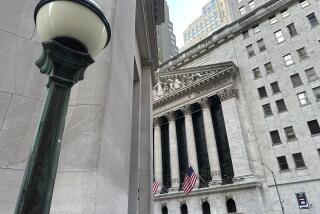T-Bond Yields Above 8% Send Stocks Tumbling : Economy: The rate follows weeks of bearishness. Worries persist about inflation, supply of new bonds and weak dollar.
- Share via
Treasury bond yields surged above 8% for the first time in 2 1/2 years Monday, sending stocks tumbling amid persistent concern about inflation, an upcoming supply of new bonds and a weak dollar.
The long bond’s push through the psychologically key 8% yield follows weeks of bearishness in the Treasury market. Worried about the timing of the Federal Reserve Board’s next rate hike, most investors and traders have had little appetite for buying bonds.
The key 30-year bond yield ended the day at 8.04%, up from Friday’s 7.97%. Its price, which moves in the opposite direction, closed down 23/32 point, or $7.19 per $1,000 in face value. The last time the bond yield was that high was on April 29, 1992, when it closed at 8.06%.
The rising interest rates wiped out gains from an early buying spree sparked by surprisingly strong third-quarter profits by Caterpillar Inc. leaving the Dow Jones industrial average down 36.0 points at 3,855.30. The day’s slide brought the blue-chip indicator’s three-day losses to 81 points. The broader market also fell sharply with declining issues outnumbering advances by about 13 to 6 on the New York Stock Exchange.
After jumping more than half a percentage point in the last seven weeks, the market attempted to push bond yields above 8% several times in the past week. But the yield closed just below that level as reluctant traders and investors shied away at the last minute.
But about midmorning Monday, the yield shot above 8% in a flurry of heavy selling, according to Robin Mesch, chief fixed-income analyst at Thomson Financial Services in Boston.
The Treasury market’s skittishness follows recent reports that economic strength continues unabated. A robust economy raises the likelihood that the Fed will raise interest rates again to quell inflation, which tends to spiral upward when the economy expands.
Bond traders are concerned that word of the economy’s strength will be underlined this week by data, including September consumer confidence, durable goods and third-quarter gross domestic product.
If the reports show more strength, traders believe, a rate hike is likely by the next meeting of the Fed’s policy-making panel in mid-November. Higher rates depress the value of bonds already in circulation, so the prospect gives traders little reason to buy Treasury securities.
Bond prices dropped in tandem with a sharp decline in the dollar’s value against the German mark, reinforcing a recent trend of parallel movements in the Treasury and foreign exchange markets.
As in the past, bond investors feared that a weak dollar would aggravate inflation by driving up the price of imports into the United States. In addition, a lower dollar tends to discourage foreign investors from buying dollar-denominated investments such as Treasury bonds.
The dollar finished in New York at 1.494 German marks, down from 1.499 on Friday. It also fell against the Japanese yen, closing at 97.13 yen, down from 97.19.
Analysts said the dollar’s weakness alone is not likely to force the Fed to raise short-term interest rates, but it caused added concern among investors already jittery over inflation, since imports would cost more.
On Wall Street, stocks moved higher early in the session, encouraged by strong corporate earnings reports from Caterpillar, Black & Decker, U.S. Healthcare and others. But as interest rates pushed sharply upward, stocks also tumbled.
“Last week the market stared 4,000 (on the Dow) in the eye and blinked. Now it’s coming back down,” said Walter Revis, market analyst at Principal Financial Securities.
“It’s just one more thing for them to be a little more nervous about,” said Thomas Kirkenmeier, vice president at Northern Trust Co.
With interest rates rising, investors are wondering if the economic recovery may have peaked and corporate earnings forecasts for 1995 will have to be revised lower.
The NYSE’s composite index fell 2.09 points to 253.50. The Standard & Poor’s 500-stock index fell 4.06 points to 460.83 and the Nasdaq composite index of mostly smaller companies fell 4.17 to 761.21. At the American Stock Exchange, the market value index lost 2.63 to 453.72.
Among the market highlights:
* Interest-rate sensitive stocks were among the day’s losers. American International Group fell 1 1/4 to 90 1/4 and Federal National Mortgage Assn. lost 1 7/8 to 75.
* Caterpillar earnings were a better-than-expected $1.20 a share and the stock rose 1 7/8 to 58 1/4.
* Black & Decker earnings were 31 cents a share compared to an estimate by private economists of 28 cents. The stock rose 5/8 to 23 3/8.
* Earnings for U.S. Healthcare, listed on the Nasdaq market, were 63 cents a share, compared to an estimate of 59 cents. The stock rose 1 3/4 to 47.
* Airborne Freight dropped 6 3/8 to 19 1/8 after its third-quarter earnings of 38 cents a share fell under Wall Street forecasts.
* Stratus Computer jumped 1 3/4 to 36 1/4 after it posted a sharp rise in third-quarter profits.
* Pfizer rose 5/8 to 73 7/8 after telling analysts it will have six drugs in Phase III clinical trials by the end of the year and expects to have a company record of 14 new chemical entities in advanced Phase III trials next year.
Stocks ended mixed in overseas trading. In Tokyo, the 225-share Nikkei average ended down 46.71 points at 19,852.37. Frankfurt’s DAX 30-share average rose 3.16 points to close at 2,025.38, while London’s Financial Times 100-share average fell 3.7 to 3,029.1. Mexico City’s Bolsa index closed 53.24 points lower at 2,633.62.
Market Roundup, D10
More to Read
Inside the business of entertainment
The Wide Shot brings you news, analysis and insights on everything from streaming wars to production — and what it all means for the future.
You may occasionally receive promotional content from the Los Angeles Times.










